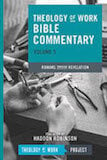Best of Daily Reflections: Full Christianity: Doing, Thinking, and Being, Part 5
Daily Reflection / Produced by The High Calling
So I tell you this, and insist on it in the Lord, that you must no longer live as the Gentiles do, in the futility of their thinking.
Ephesians 4:17
In yesterday's reflection, we focused on the phrase used in Ephesians 4:17 to describe the thought patterns of unbelievers: "the futility of their thinking." If we are to experience the fullness of Christianity, then we must put aside worldly ways of thinking and learn to think in God's ways. As you may recall, I illustrated this truth by noting how our world employs a "more stuff = more happiness" mindset. In fact, however, happiness is not substantially increased when one has more possessions, even though our culture teaches us to think this way.
Today, I want to touch upon another example of futile thinking that is common in our world. This mindset sees work as drudgery, as something to be endured, as that which we have to do in order to live. We talk of "work-life balance" as if work were not a part of life, but something extrinsic to it. This devaluing of work plainly contradicts the biblical perspective, in which human beings were created in God's image with work to be done (see Genesis 1 and 2). Work is essential to our flourishing as God's creatures who have a unique, God-imitating role on earth.
Given that we were created by God the worker to be beings who work, it should not come as a surprise to learn that work contributes significantly to our happiness, far more than having lots of stuff. In a newspaper article, Arthur C. Brooks considers whether or not there is "A Formula for Happiness." Social science research indicates that much of happiness is determined by our genetic inheritance and our circumstances. But, beyond these factors, Brooks explains, "It turns out that choosing to pursue four basic values of faith, family, community and work is the surest path to happiness." Yes, notice that work makes the short list. Why? Because, Brooks writes, "Work can bring happiness by marrying our passions to our skills, empowering us to create value in our lives and in the lives of others."
Of course, there is another extreme in our culture, one that values work above all else. Success on the job means everything and is worth every sacrifice. This notion of work twists the biblical valuation of work, turning work into an idol. It also leads us to minimize aspects of life that, according to Arthur Brooks, are essential for happiness: faith, family, and community.
If we set aside worldly ways of thinking about work and embrace God's vision, we will be able to live fruitfully, with our work as a primary means to serve God and our fellow human beings, as well as a way to enjoy the fullness of life God intends for us.
FOR REFLECTION: How do you think about work? Do you lean toward seeing work as necessary drudgery? Or do you tend to put too much value on work? What helps you to see your work—whether paid or unpaid—as an expression of your created identity? How might you offer your work to God this day?
PRAYER: Gracious God, thank you for creating me in your image, as one capable of and called to work. Help me, I pray, to think of work in ways that reflect your vision. Keep me from seeing work as mere drudgery. Help me not to turn my work into an idol. Rather, may I learn to think about work as you think, so that I might live with a right balance of work, rest, and even play. May my work today honor you. Amen.
________________________________________________________
P.S. from Mark: As you may know, The High Calling, of which this Daily Reflection is a part, exists to help you discover how to see your work as an essential and meaningful element of your high calling to serve the Lord. If you're looking for new ways to think about work, you might want to check out several articles on The High Calling that examine an excellent book on work: Every Good Endeavor: Connecting Your Work to God's Work, by Timothy Keller and Katherine Leary Alsdorf.






